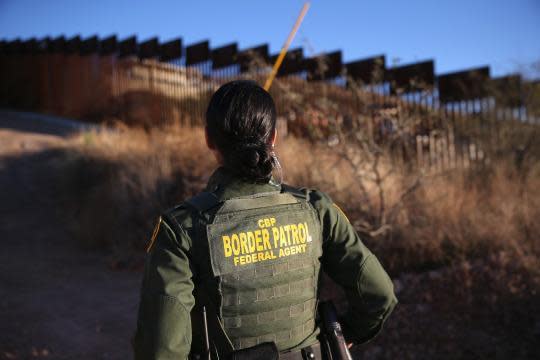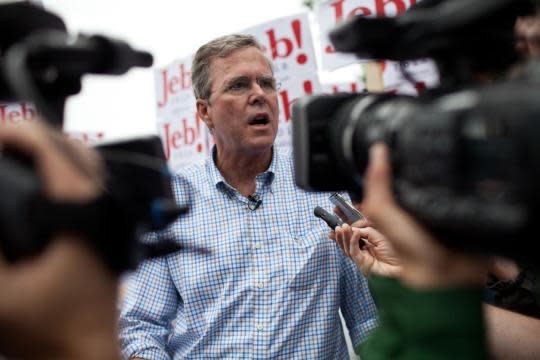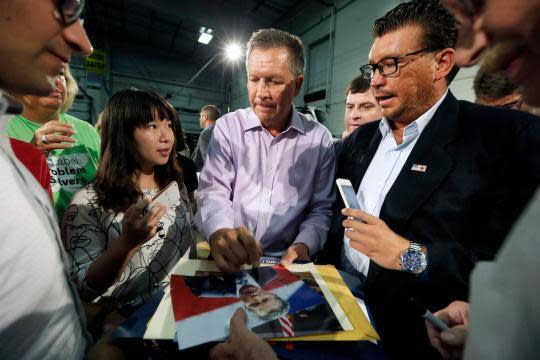Cleveland clash: 5 things to watch for at the GOP debate
By Andrew Romano
For the past few months, every conversation about the first debate of the 2016 Republican primary season, which will take place Thursday night at 9 p.m. ET in Cleveland and air on Fox News, has started and ended with the question “Who?”—as in “Who will poll high enough to be one of the 10 candidates to make the final cut?” But now that we know Thursday’s lineup — Donald Trump, Jeb Bush, Scott Walker, Mike Huckabee, Ben Carson, Ted Cruz, Marco Rubio, Rand Paul, Chris Christie and John Kasich — it’s worth asking a new question.
What should smart viewers be watching for on debate night?
Presidential debates — and especially overstuffed presidential primary debates like the upcoming Fox face-off — aren’t really debates at all. They’re more like media manipulation moments: high-profile opportunities for the candidates to seize the national spotlight, however briefly, and use it for their own purposes.
With that in mind, here are five key factors to pay attention to Thursday night.

Thursday’s debate will (depressingly, entertainingly) revolve around Donald Trump. (Photo: Scott Heppell/AP)
1. The Trump killer
Someday Republicans will say “you’re fired” to Donald Trump, and the trashy reality show into which he’s transformed the party’s 2016 nominating contest will finally come to an end. But that day won’t be Thursday. For an entire month now, The Donald has stood atop the GOP polls — his current lead over former frontrunner Jeb Bush averages 10.4 percentage points — and on Thursday he will stand center stage in Cleveland.
Make no mistake: The Fox News debate will (depressingly, entertainingly) revolve around Trump. But while the billionaire bloviator’s strategy is clear — he’s been riling up disgruntled right-wingers by indiscriminately insulting his fellow Republicans, including Lindsey Graham (“lightweight”), Bobby Jindal (“zero”) and John McCain (“not a war hero”) — it remains to be seen how the rest of the field will respond to his abuse. Some, like John Kasich, have refused to play Trump’s game. Others, like Graham, have pushed back. At least one, Ted Cruz, has tried to curry favor with the Manhattan real estate mogul, perhaps in hopes of inheriting his base when his campaign inevitably implodes.
But to make a real impact at the debate, a candidate — or questioner, like Fox’s “adversarial” Chris Wallace — would be wise to treat Trump less like a celebrity gadfly than like an actual politician (for once). That means challenging his commitment to conservative principles and forcing him to own up to a record that is much more liberal than most Republican voters realize. (For most of the past decade Trump was a “strongly pro-choice” Democrat who donated the majority of his $1.3 million in political contributions to the likes of Hillary Clinton and Harry Reid while supporting “massive tax increases on the wealthy” and “a Canadian-style single-payer health care system,” as conservative columnist Peter Wehner recently put it.) It also means confronting him about his near-treasonous refusal to rule out a third party run, which would almost certainly spoil the GOP’s chances of winning back the White House in 2016. Whoever can manage that will be the person the press will be paying the most attention to Friday morning — not Trump.

In his 1988 vice presidential debate with Dan Quayle, Lloyd Bentsen uttered the words “Senator, you’re no Jack Kennedy.” (Photo: Ron Edmonds/AP)
2. The meme
Unlike their collegiate counterparts, presidential debates have long been decided not by who scores the most points but by who delivers the most memorable lines — for better or for worse. Think of Lloyd Bentsen in 1988 (“Senator, you’re no Jack Kennedy”) or Rick Perry in 2012 (“Oops”). Fair? Not really. But that’s how the media works. And now, by compressing, amplifying and accelerating the news, Twitter and Facebook have only compounded the problem.
Recall 2012, when short, telling catchphrases — “Big Bird,” “binders full of women,” “horses and bayonets” — drowned out the rest of what Barack Obama and Mitt Romney had to say on the debate stage. Four years later, the GOP nominating contest has effectively been reduced, at least in its early stages, to a desperate battle over who can break out of an overcrowded, Trump-dominated field by saying something — in 140 characters or less — that will set the conservative Internet on fire. That’s why Chris Christie has been threatening to punch a teachers’ union in its collective face. It’s why Cruz is accusing the Obama administration of becoming the “world’s leading financier of radical Islamic terrorists.” It’s why Mike Huckabee is talking about Obama marching Israelis to the “door of the oven.” And it’s why Rand Paul has declared that highly taxed people are “half slave” and released a video in which he sets the tax code on fire.
Expect the trend to continue Thursday night in Cleveland. Still, the candidates should be careful what they wish for: The only thing the viral Web loves more than a good zinger is a good gaffe.

At Monday’s candidate forum in New Hampshire, immigration dominated the discussion. Thursday’s debate may tread similar ground. (Photo: John Moore/Getty Images)
3. The big issue
Fortunately, Thursday’s debate won’t be all about Trump and Twitter-ready one-liners; policy will play a major part as well. The primary field is huge and fractured, more divided by disagreements over ideology and issues than any other in recent memory. And those disagreements will definitely surface on Thursday night.
The question is which ones will stick. At Monday’s Voters First Forum in New Hampshire, immigration dominated the discussion. Everyone agreed — as Republicans are required to do — that America still needs to “secure the border” with Mexico. But otherwise, the candidates were all over the map. Rick Santorum repeated his call for a temporary 25 percent reduction in legal immigration; Graham advocated for a bipartisan plan; Marco Rubio denounced the sort of comprehensive approach that he had previously endorsed; Kasich signaled that, as president, he would be open to a pathway to citizenship.
The Fox News debate will certainly revisit immigration. But given this week’s news, it seems likely that Planned Parenthood (and women’s issues in general) will be the the issue that captures the moderators’ and the media’s attention on Thursday night. Last month, antiabortion activists released undercover videos that showed Planned Parenthood officials discussing, in graphic detail, the process of extracting organs from aborted fetuses and transferring them to research companies for a fee, setting off a push in Congress — supported by the GOP presidential pack — to halt federal funding for the group, which in turn prompted Hillary Clinton to accuse Republicans of conducting a “full-on assault on women’s health.”
This is tricky terrain for a party that can ill afford to further alienate women voters, who already view the GOP as “intolerant,” “lacking in compassion” and “stuck in the past.” So far, Christie is the only national Republican figure who seems to be itching to brawl over the issue. Will any of his fellow candidates join him in Cleveland? If not, how will they address the controversy?

From the moment Jeb Bush announced he would be “actively exploring” a candidacy, he has been considered the closest thing to a GOP frontrunner. (Photo: Kayana Szymczak/Getty Images)
4. The backlash
Presidential campaigns are stories: the stories the candidates tell about themselves; the stories the press tells about the candidates. All good stories have an arc. And more than any other event on the political calendar, live, televised debates have the power to alter that arc. For the White House hopefuls who enter the debate hall riding relatively high in the polls — in this case, Jeb Bush and Scott Walker — that can be dangerous. Especially early on, when most voters have yet to see them in action before debate night.
From the moment Bush announced last December that he would be “actively exploring” a 2016 run, he has been seen as the closest thing the GOP has to a frontrunner. He’s a member of the most prominent family in Republican politics. He ran one of the biggest, most electorally significant states in the country. He has raised more than $120 million to date — far more than any of his opponents. And Trump aside, he has led, albeit narrowly, in the vast majority of polls released since the start of 2015. As a result, voters tuning in to the race for the first time Thursday night will be expecting an impressive performance from him. And yet, for months, Bush has been stumbling on the trail. He can be a meandering, unfocused speaker. He is prone to gaffes (like his latest misstep on women’s health). And he seems almost constitutionally unable to serve up the kind of red-meat rhetoric conservatives are currently clamoring for. If Bush continues to be underwhelming in Cleveland, expect the backlash to begin in earnest — and for his storyline to shift overnight from “establishment favorite” to “not ready for primetime.”
Walker faces a similar challenge. After a combative speech at the Iowa Freedom Summit in January, the Wisconsin governor rocketed to the front of the pack in the Hawkeye State, which in turn propelled him into the top tier nationwide. (Walker has overtaken Bush in some recent polls.) The conservative base likes what he represents: a fresh-faced evangelical Christian who has fought the public sector unions and won. But live and in person, Walker risks disappointing voters who know him only by reputation. After a series of early fumbles that alarmed party leaders and donors — comparing pro-union protesters to Islamic State terrorists, refusing to answer a question about evolution, saying he does not know if President Obama is a Christian or if he loves America — Walker immersed himself in a months-long crash course with his policy advisers. The new, allegedly more prepared candidate debuts Thursday on the national stage. If Walker doesn’t deliver — if he doesn’t seem like a credible president who is well informed about the world outside of Wisconsin — viewers might start to wonder what all the hype was about.

The newest candidate in the race, Ohio Gov. John Kasich can be an earthy, effective performer. (Photo: Charlie Neibergall/AP)
5. The Cinderella story (or the comeback kid)
Center stage may be a perilous place to stand Thursday night, but for the candidates on the fringes — Kasich and Christie — the Fox debate represents a perfect opportunity to get the media telling a new, more favorable story about their campaigns.
Of all the combatants in Cleveland, Kasich may be the best positioned to make headlines. He’s the newest candidate in the race — and the press is always looking for the next big thing. Until last week, few observers believed he would even make the cut. (Now he’s in second place in New Hampshire.) He has an impressive pitch to make about balancing the budget in Washington, D.C., and presiding over an improving economy in Ohio (which is the crucial swing state for Republicans). He’s on his home turf. And he can be a very earthy, effective performer: Last November he stole the show at a Florida meeting of the Republican Governors Association by reproaching bomb throwers like Walker and Jindal and depicting himself as “ a problem solver who wants economic growth but also wants government to help people and fix things.” A repeat performance Thursday could turn Kasich into the debate’s Cinderella story: the come-from-behind surprise who instantly heightens his profile by exceeding everyone’s low — or even nonexistent — expectations.
As for Christie, he’s been down for so long — the bridge scandal, the dismal approval ratings — that the only place to go now may be up. A lesser politician would never be able to mount that kind of a comeback. But for all his flaws, Christie is a world-class talker who can connect with real people like few other elected officials. If he manages to land some good punches Thursday night while also touting his bold proposals on drugs and entitlement programs, rank-and-file Republicans might remember why they liked him so much in the first place — and the media might declare him back from the dead.
